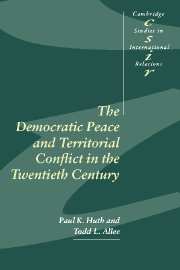Book contents
- Frontmatter
- Contents
- List of figures
- List of tables
- Acknowledgments
- 1 Another study of democracy and international conflict?
- 2 Pathways to conflict escalation and resolution in international disputes
- 3 The international strategic context
- 4 Domestic institutions and the Political Accountability Model
- 5 Domestic institutions and the Political Norms Model
- 6 Domestic institutions and the Political Affinity Model
- 7 Empirical results for decisions to challenge the status quo
- 8 Empirical results for decisions to offer concessions in negotiations
- 9 Empirical results for decisions to escalate with military force
- 10 What have we learned about the democratic peace?
- Appendices A–F
- Bibliography
- Index
- CAMBRIDGE STUDIES IN INTERNATIONAL RELATIONS
5 - Domestic institutions and the Political Norms Model
Published online by Cambridge University Press: 22 September 2009
- Frontmatter
- Contents
- List of figures
- List of tables
- Acknowledgments
- 1 Another study of democracy and international conflict?
- 2 Pathways to conflict escalation and resolution in international disputes
- 3 The international strategic context
- 4 Domestic institutions and the Political Accountability Model
- 5 Domestic institutions and the Political Norms Model
- 6 Domestic institutions and the Political Affinity Model
- 7 Empirical results for decisions to challenge the status quo
- 8 Empirical results for decisions to offer concessions in negotiations
- 9 Empirical results for decisions to escalate with military force
- 10 What have we learned about the democratic peace?
- Appendices A–F
- Bibliography
- Index
- CAMBRIDGE STUDIES IN INTERNATIONAL RELATIONS
Summary
The Political Norms Model becomes the focus of our theory building efforts in this chapter. In the Political Accountability Model, competitive elections, independent legislative powers, and the threat of military coups are key sources of accountability for leadership decisions in foreign policy. In the Political Norms Model, analytical attention shifts to the principles that shape political elite beliefs about how to bargain and resolve political conflicts with domestic and international opponents. In the Accountability Model, state leaders are rational and self-interested politicians who strategically respond to a political environment in which institutions affect the ability of political opposition to reward and punish them for the policies they adopt. In the Norms Model, leaders from democratic and non-democratic states have different beliefs about the acceptability of compromising with and coercing political adversaries. The theoretical focus of the Norms Model therefore differs in comparison to the Accountability Model. In the Accountability Model, the analysis centers on state leaders as rational actors who desire to remain in power and therefore they are attentive to the domestic political implications of foreign policy choices. While there is no reason why the logic of the Norms Model would contest the idea that leaders are rational and strategic acting politicians, the theoretical focus is directed at explaining why political leaders develop varying beliefs about the legitimacy of different strategies of accommodation and coercion in political bargaining, and then explores the implications of such beliefs for foreign policy decision-making.
- Type
- Chapter
- Information
- Publisher: Cambridge University PressPrint publication year: 2003



